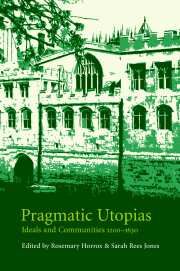Book contents
- Frontmatter
- Contents
- Preface
- List of abbreviations
- Richard Barrie Dobson: an appreciation
- 1 ‘If heaven be on this earth, it is in cloister or in school’: the monastic ideal in later medieval English literature
- 2 The ‘Chariot of Aminadab’ and the Yorkshire priory of Swine
- 3 Godliness and good learning: ideals and imagination in medieval university and college foundations
- 4 Hugh of Balsham, bishop of Ely 1256/7–1286
- 5 A cruel necessity? Christ's and St John's, two Cambridge refoundations
- 6 Coventry's ‘Lollard’ programme of 1492 and the making of Utopia
- 7 Thomas More's Utopia and medieval London
- 8 Social exclusivity or justice for all? Access to justice in fourteenth-century England
- 9 Idealising criminality: Robin Hood in the fifteenth century
- 10 Fat Christian and Old Peter: ideals and compromises among the medieval Waldensians
- 11 Imageless devotion: what kind of an ideal?
- 12 An English anchorite: the making, unmaking and remaking of Christine Carpenter
- 13 Victorian values in fifteenth-century England: the Ewelme almshouse statutes
- 14 Puritanism and the poor
- 15 Realising a utopian dream: the transformation of the clergy in the diocese of York, 1500–1630
- Bibliography of Barrie Dobson's published works
- Index
Preface
Published online by Cambridge University Press: 01 July 2009
- Frontmatter
- Contents
- Preface
- List of abbreviations
- Richard Barrie Dobson: an appreciation
- 1 ‘If heaven be on this earth, it is in cloister or in school’: the monastic ideal in later medieval English literature
- 2 The ‘Chariot of Aminadab’ and the Yorkshire priory of Swine
- 3 Godliness and good learning: ideals and imagination in medieval university and college foundations
- 4 Hugh of Balsham, bishop of Ely 1256/7–1286
- 5 A cruel necessity? Christ's and St John's, two Cambridge refoundations
- 6 Coventry's ‘Lollard’ programme of 1492 and the making of Utopia
- 7 Thomas More's Utopia and medieval London
- 8 Social exclusivity or justice for all? Access to justice in fourteenth-century England
- 9 Idealising criminality: Robin Hood in the fifteenth century
- 10 Fat Christian and Old Peter: ideals and compromises among the medieval Waldensians
- 11 Imageless devotion: what kind of an ideal?
- 12 An English anchorite: the making, unmaking and remaking of Christine Carpenter
- 13 Victorian values in fifteenth-century England: the Ewelme almshouse statutes
- 14 Puritanism and the poor
- 15 Realising a utopian dream: the transformation of the clergy in the diocese of York, 1500–1630
- Bibliography of Barrie Dobson's published works
- Index
Summary
When the editors were considering a suitable topic for this festschrift they found themselves, as one might expect with an honorand of Barrie Dobson's range of interests, spoilt for choice. It was Sarah Rees Jones who came up with the theme of Utopias and Idealists, which pays tribute both to Barrie's strong interest in social justice, reflected in his work on the Peasants' Revolt and Robin Hood, and also to his long-standing engagement with the aspirations and achievements of medieval communities and their administrators, both ecclesiastical and secular. This wide range of interests, to which John Taylor pays proper tribute below, has equipped Barrie with a special understanding of the relationship between idealism and pragmatism that has informed his equally long-standing interest in the life and work of Thomas More.
The initial hope was that this would be a subject that would draw together contributions from modernists as well as medievalists. That, sadly, foundered. Collections of papers ranging from the early Middle Ages to the twentieth century are not thought viable publishing ventures these days. Several of Barrie's friends and colleagues who had hoped to contribute were accordingly unable to do so, and the choice of topic (and the need to keep the collection within reasonable length) excluded others. Those friends and colleagues of Barrie whose papers are included here are conscious that they stand for a great many others who wished to be involved, and whose good wishes go with them.
- Type
- Chapter
- Information
- Pragmatic UtopiasIdeals and Communities, 1200–1630, pp. vii - viiiPublisher: Cambridge University PressPrint publication year: 2001

